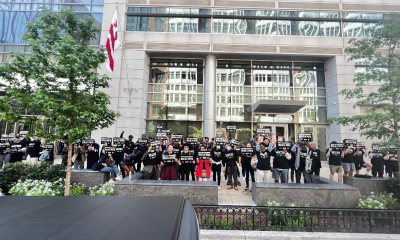#NNPA BlackPress
COMMENTARY: Are Blacks Close to Receiving Reparations?
NNPA NEWSWIRE — From a historical perspective, approximately 4,000,000 Africans and their descendants were enslaved in the U.S. and colonies that became the U.S. from 1619 to 1865. The institution of slavery was constitutionally and statutorily sanctioned by the U.S. from 1789 through 1865.
By Jeffrey L. Boney, NNPA Political Analyst
Blacks have been trying to level the economic and societal playing fields in this country for some time. When it comes to the concept of granting “reparations” to Black people as a form of restitution for the years that Blacks spent subjected to the barbaric institution of slavery in America, it has seemingly been overlooked and ignored by the majority of legislators that have come and gone in the U.S. Congress.
Many Blacks have heard and even used the phrase, “40 acres and a mule,” which was a guarantee made to formerly enslaved people of African descent that was the first attempt at seeking to provide some form of reparations to Blacks who had been enslaved.
Of course, history shows us that the decision makers who talked about the idea of providing reparations to people of African descent who were previously enslaved, reneged on their promise, leaving Blacks to work harder and longer to achieve success than those who had enslaved them to begin with. This has proven to be extremely challenging for Blacks.
U.S. history has set precedent for providing reparations to several groups, including Japanese Americans, who have suffered challenges.
In 1942, during World War II, the U.S. created internment camps where roughly 125,000 people of Japanese descent were essentially enslaved as a result of an executive order from then-president Franklin Delano Roosevelt. The rationale for their inhumane detention was that people of Japanese descent were suspected to have been conspiring against the U.S.
Sadly, many of these people were American citizens, but that did not matter because they were forcibly detained and made to move from their homes to the internment camps.
Congress decided to institute a reparation fund after recognizing the actions of the U.S. government resulted in estimated losses of several billion dollars sustained due to the loss of property and the ability to make a living suffered by those of Japanese descent.
As a result, each survivor was eventually awarded $20,000, with approximately 80,000 people of Japanese descent claiming the reparations that they were entitled to.
This action cost the U.S. government approximately $1.6 billion in reparations and remains a dark stain on America’s history.
Here in America, descendants of the people of African descent that were enslaved and experienced some of the cruelest ordeals imaginable, should be looked upon no differently than any other group. As with Japanese Americans during and after World War II, African Americans continue to experience their own unique challenges and issues.
From a historical perspective, approximately 4,000,000 Africans and their descendants were enslaved in the U.S. and colonies that became the U.S. from 1619 to 1865. The institution of slavery was constitutionally and statutorily sanctioned by the U.S. from 1789 through 1865.
African Americans continue to suffer debilitating economic, educational, and health hardships, including but not limited to the nearly 1,000,000 Black people incarcerated, an unemployment rate that is more than twice the current unemployment rate of Whites, and an average wealth of less than 1⁄16 of that of White families, a disparity which has worsened, not improved, over time.
While the focus has been on highlighting the social effects of slavery and segregation, the continuing economic implications remain largely ignored by mainstream analysis. These economic issues are the root cause of many critical issues in the African American community today, such as education, healthcare and criminal justice policy, including policing practices.
The call for reparations represents a commitment to enter a constructive dialogue on the role of slavery and racism in shaping present-day conditions in our community and American society.
Former U.S. Congressman John Conyers Jr. (D-MI) once proposed creating a Commission to study how to appropriately compensate the descendants of slaves for decades, with those conversations falling on deaf ears.
Understanding the unique challenges that African Americans face here in America, U.S. Congresswoman Sheila Jackson Lee (D-TX) is hoping that a bill she is now championing, in the spirit of former Rep. Conyers, gets the level of support and traction needed to help African Americans finally receive the guarantee promised to them back in the late 1800s.
Congresswoman Jackson Lee recently introduced H.R. 40, a bill to establish a Commission to Study and Develop Reparations Proposals for African Americans Act. This piece of legislation would create a Commission aimed at studying the impact of slavery and continuing discrimination against African Americans, resulting directly and indirectly from slavery to segregation to the desegregation process and the present day.
The Commission would also make recommendations concerning any form of apology and compensation to begin the long-delayed process of atonement for slavery.
“The impact of slavery and its vestiges continues to affect African Americans and indeed all Americans in communities throughout our nation, which is why I am pleased to introduce H.R. 40,” said Congresswoman Lee. “This legislation is intended to examine the institution of slavery in the colonies and the United States from 1619 to the present, and further recommend appropriate remedies.”
Congresswoman Jackson Lee states that since the initial introduction of this legislation, its proponents have made substantial progress in elevating the discussion of reparations and reparatory justice at the national level, joining the mainstream international debate on the issue.
She went on to state that some people have tried to deflect the importance of these conversations by focusing on individual monetary compensation, but the real issue is whether and how this nation can come to grips with the legacy of slavery that still infects current society.
According to the bill, the Commission shall be composed of 13 members, who shall be appointed, within 90 days after the date of enactment of this Act, as follows:
- Three members shall be appointed by the President.
- Three members shall be appointed by the Speaker of the House of Representatives.
- One member shall be appointed by the President pro tempore of the Senate.
- Six members shall be selected from the major civil society and reparations organizations that have historically championed the cause of reparatory justice.
In short, the Commission would be tasked with studying the impact of slavery and the continuing discrimination against African Americans, which has come as a direct and indirect result of slavery, as well as from segregation and other present-day factors.
According to the bill, the Commission would also make recommendations concerning any form of apology and compensation to begin the long-delayed process of atonement for slavery.
Congresswoman Jackson Lee believes that through legislation, resolutions, news, and litigation, Congress is moving closer to making strides towards reparations.
Congresswoman Jackson Lee points out that despite the progress that has been made in this country, including the election of the first American President of African descent, the legacy of slavery still lingers heavily in this nation.
She believes this bill, which seeks to establish a Commission to examine the moral and social implications of slavery, is both relevant and crucial to restoring trust in governmental institutions in many communities, especially during a time where there are many reoccurring issues affecting African Americans in ways that are different from other communities.
“Today there are more people at the table — more activists, more scholars, more CEO’s, more state and local officials, and more Members of Congress,” said Congresswoman Jackson Lee. “I believe that H.R. 40 is a crucial piece of legislation because it goes beyond exploring the economic implications of slavery and segregation. Though the times and circumstances may change, the principle problem of slavery continues to weigh heavily on this country. A federal commission can help us reach into this dark past and bring us into a brighter future.”
Surprisingly, the topic of reparations for slavery for African Americans has intensified, with several Democratic presidential candidates, including Sen. Cory Booker, Sen. Kamala Harris, former San Antonio Mayor Julian Castro, Sen. Elizabeth Warren and former Rep. Beto O’ Rourke, each voicing their support for reparations, supporting Rep. Jackson Lee’s bill.
The National Newspaper Publishers Association (NNPA), which represents over 200 Black-owned media companies across the U.S., will continue to follow this extremely important legislation and the discussions surrounding this pertinent issue concerning people of African descent all across this country.
Jeffrey L. Boney is a political analyst and international correspondent for the NNPA Newswire and BlackPressUSA.com and serves as Associate Editor for the Houston Forward Times newspaper. Jeffrey is an award-winning journalist, dynamic international speaker, experienced entrepreneur, business development strategist and founder and CEO of the Texas Business Alliance. Follow Jeffrey on Twitter @realtalkjunkies
#NNPA BlackPress
IN MEMORIAM: Ramona Edelin, Influential Activist and Education Advocate, Dies at 78
NNPA NEWSWIRE — Born on September 4, 1945, in Los Angeles, California, activist Ramona Edelin’s early years were marked by a commitment to education and social justice. According to her HistoryMakers biography, after graduating from Fisk University with a Bachelor’s degree in 1967, she pursued further studies at the University of East Anglia in England. She earned her master’s degree before completing her Ph.D. at Boston University in 1981.
The post IN MEMORIAM: Ramona Edelin, Influential Activist and Education Advocate, Dies at 78 first appeared on BlackPressUSA.

By Stacy M. Brown, NNPA Newswire Senior National Correspondent
@StacyBrownMedia
Once upon a time, Black Americans were simply known as colored people, or Negroes. That is until Ramona Edelin came along. The activist, renowned for her pivotal roles in advancing civil rights, education reform, and community empowerment, died at her D.C. residence last month at the age of 78. Her death, finally confirmed this week by Barnaby Towns, a communications strategist who collaborated with Dr. Edelin, was attributed to cancer.
Born on September 4, 1945, in Los Angeles, California, Edelin’s early years were marked by a commitment to education and social justice. According to her HistoryMakers biography, after graduating from Fisk University with a Bachelor’s degree in 1967, she pursued further studies at the University of East Anglia in England. She earned her master’s degree before completing her Ph.D. at Boston University in 1981.
Edelin’s contributions to academia and activism were manifold. She was pivotal in popularizing the term “African American” alongside Rev. Jesse L. Jackson in the late 1980s.
Jackson had announced the preference for “African American,” speaking for summit organizers that included Dr. Edelin. “Just as we were called Colored, but were not that, and then Negro, but not that, to be called Black is just as baseless,” he said, adding that “African American” “has cultural integrity” and “puts us in our proper historical context.”
Later, Edelin told Ebony magazine, “Calling ourselves African Americans is the first step in the cultural offensive,” while linking the name change to a “cultural renaissance” in which Black Americans reconnected with their history and heritage.
“Who are we if we don’t acknowledge our motherland?” she asked later. “When a child in a ghetto calls himself African American, immediately he’s international. You’ve taken him from the ghetto and put him on the globe.”
The HistoryMakers bio noted that Edelin’s academic pursuits led her to found and chair the Department of African American Studies at Northeastern University, where she established herself as a leading voice.
Transitioning from academia to advocacy, Edelin joined the National Urban Coalition in 1977, eventually ascending to president and CEO. During her tenure, she spearheaded initiatives such as the “Say Yes to a Youngster’s Future” program, which provided crucial support in math, science, and technology to youth and teachers of color in urban areas. Her biography noted that Edelin’s efforts extended nationwide through partnerships with organizations like the National Science Foundation and the United States Department of Education.
President Bill Clinton recognized Edelin’s expertise by appointing her to the Presidential Board on Historically Black Colleges and Universities in 1998. She also co-founded and served as treasurer of the Black Leadership Forum, solidifying her standing as a respected leader in African American communities.
Beyond her professional achievements, Edelin dedicated herself to numerous boards and committees, including chairing the District of Columbia Educational Goals 2000 Panel and contributing to the Federal Advisory Committee for the Black Community Crusade for Children.
Throughout her life, Edelin received widespread recognition for her contributions. Ebony magazine honored her as one of the 100 Most Influential Black Americans, and she received prestigious awards such as the Southern Christian Leadership Award for Progressive Leadership and the IBM Community Executive Program Award.
The post IN MEMORIAM: Ramona Edelin, Influential Activist and Education Advocate, Dies at 78 first appeared on BlackPressUSA.
#NNPA BlackPress
Tennessee State University Board Disbanded by MAGA Loyalists as Assault on DE&I Continues
NNPA NEWSWIRE — Recent legislative actions in Tennessee, such as repealing police reform measures enacted after the killing of Tyre Nichols, underscore a troubling trend of undermining local control and perpetuating racist agendas. The new law preventing local governments from restricting police officers’ authority disregards community efforts to address systemic issues of police violence and racial profiling.
The post Tennessee State University Board Disbanded by MAGA Loyalists as Assault on DE&I Continues first appeared on BlackPressUSA.

By Stacy M. Brown, NNPA Newswire Senior National Correspondent
@StacyBrownMedia
Tennessee State University (TSU), the state’s only public historically Black college and university (HBCU), faces a tumultuous future as Gov. Bill Lee dissolved its board, a move supported by racist conservatives and MAGA Republicans in the Tennessee General Assembly, who follow the lead of the twice-impeached, four-times indicted, alleged sexual predator former President Donald Trump. Educators and others have denounced the move as an attack on diversity, equity, and inclusion (DE&I) and a grave setback for higher education.
Critics argue that TSU’s purported financial mismanagement is a manufactured crisis rooted in decades of underinvestment by the state government. They’ve noted that it continues a trend by conservatives and the racist MAGA movement to eliminate opportunities for Blacks in education, corporate America, and the public sector.
Gevin Reynolds, a former speechwriter for Vice President Kamala Harris, emphasizes in an op-ed that TSU’s financial difficulties are not the result of university leadership because a recent audit found no evidence of fraud or malfeasance.
Reynolds noted that the disbanding of TSU’s board is not an isolated incident but part of a broader assault on DE&I initiatives nationwide. Ten states, including Tennessee, have enacted laws banning DE&I policies on college campuses, while governors appointing MAGA loyalists to university trustee positions further undermine efforts to promote inclusivity and equality.
Moreover, recent legislative actions in Tennessee, such as repealing police reform measures enacted after the killing of Tyre Nichols, underscore a troubling trend of undermining local control and perpetuating racist agendas. The new law preventing local governments from restricting police officers’ authority disregards community efforts to address systemic issues of police violence and racial profiling.
The actions echo historical efforts to suppress Black progress, reminiscent of the violent backlash against gains made during the Reconstruction era. President Joe Biden warned during an appearance in New York last month that Trump desires to bring the nation back to the 18th and 19th centuries – in other words, to see, among other things, African Americans back in the chains of slavery, women subservient to men without any say over their bodies, and all voting rights restricted to white men.
The parallels are stark, with white supremacist ideologies used to justify attacks on Black institutions and disenfranchise marginalized communities, Reynolds argued.
In response to these challenges, advocates stress the urgency of collective action to defend democracy and combat systemic racism. Understanding that attacks on institutions like TSU are symptomatic of broader threats to democratic norms, they call for increased civic engagement and voting at all levels of government.
The actions of people dedicated to upholding the principles of inclusivity, equity, and justice for all will determine the outcome of the ongoing fight for democracy, Reynolds noted. “We are in a war for our democracy, one whose outcome will be determined by every line on every ballot at every precinct,” he stated.
The post Tennessee State University Board Disbanded by MAGA Loyalists as Assault on DE&I Continues first appeared on BlackPressUSA.
#NNPA BlackPress
Braxton Haulcy and the Expansion of Walker|West Music Academy
May 24, 2023 – Walker West Music Academy gets an early start on expansion. Join us for a Wednesday episode of The …
The post Braxton Haulcy and the Expansion of Walker|West Music Academy first appeared on BlackPressUSA.

May 24, 2023 – Walker West Music Academy gets an early start on expansion. Join us for a Wednesday episode of The …
The post Braxton Haulcy and the Expansion of Walker|West Music Academy first appeared on BlackPressUSA.
-

 Community2 weeks ago
Community2 weeks agoFinancial Assistance Bill for Descendants of Enslaved Persons to Help Them Purchase, Own, or Maintain a Home
-

 Activism4 weeks ago
Activism4 weeks agoOakland Post: Week of April 3 – 6, 2024
-

 Business2 weeks ago
Business2 weeks agoV.P. Kamala Harris: Americans With Criminal Records Will Soon Be Eligible for SBA Loans
-

 Community2 weeks ago
Community2 weeks agoAG Bonta Says Oakland School Leaders Should Comply with State Laws to Avoid ‘Disparate Harm’ When Closing or Merging Schools
-

 Activism3 weeks ago
Activism3 weeks agoOakland Post: Week of April 10 – 16, 2024
-

 Community2 weeks ago
Community2 weeks agoOakland WNBA Player to be Inducted Into Hall of Fame
-

 Community2 weeks ago
Community2 weeks agoRichmond Nonprofit Helps Ex-Felons Get Back on Their Feet
-

 Community2 weeks ago
Community2 weeks agoRPAL to Rename Technology Center for Retired Police Captain Arthur Lee Johnson






















































